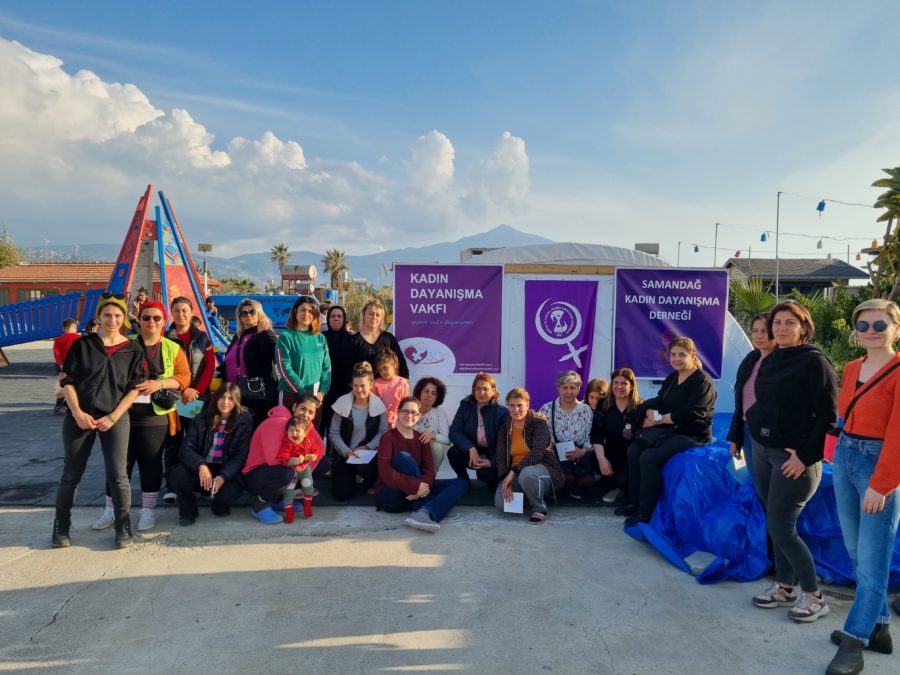
[vc_row][vc_column][vc_column_text]The Foundation for Women’s Solidarity (Kadın Dayanışma Vakfı) is a feminist women’s organisation dedicated to combating gender inequality and all forms of gender-based violence. The foundation provides free counselling support to women experiencing violence, organises awareness-raising activities, and actively engages in advocacy and networking. The foundation received a grant from our Gender Equality Fund to improve the capacity of their women’s counselling centre and expand their outreach by employing a second social worker.
Read below our interview:
Which organisational development areas have you focused on with the grant support provided by our Gender Equality Fund? Can you elaborate on your activities?
With the grant, we concentrated on fostering an empowering psychosocial support process at our women’s counseling centre. Our efforts were directed at women who reached out to us after experiencing violence, seeking support via phone, email, or in person. We employed a social worker to carry out this process, offering information on legal, psychological, and social support mechanisms according to the women’s specific needs.
We also established communication with institutions combating violence against women, which helped us offer more informed guidance. We participated in events and carried out neighbourhood outreaches. Workshops helped in expanding our volunteer network, and strengthening organisational communication led to increased outreach.
Reflecting on the Foundation’s 30th anniversary, can you highlight significant changes in your field of work and the evolution of your organisation in response to them?
In our 30 years of combating gender inequality and violence against women, we’ve continually adapted to changing circumstances. The feminist women’s movement in Türkiye adeptly responds to evolving situations. Despite escalating pressures, our strength stemmed from collective experiences and networks with other women’s organisations and feminists, bolstering our resilience.
During this period, we prioritised enhancing our organisational capacity, expanding volunteer networks, reaching more women, and increasing visibility. Strengthening ties with the feminist movement and focusing on data collection and monitoring were key areas of development.
Following the Kahramanmaras earthquakes, can you share your organisation’s activities in the field and your views on the post-earthquake response’s coordination and its impact on women?
After the earthquakes, we aimed to stand in solidarity with women in affected areas on International Women’s Day. Utilising social media, we called for support to address women’s personal hygiene and clothing needs, collaborating with the Samandağ Women’s Solidarity Association. A social worker and a lawyer travelled to distribute supplies and engage with the women.
On 8 March, we held a meeting in Samandağ, where we met around 50 women. We created a space for the women to share their experiences and feelings, and they expressed that the burden of caregiving had increased after the earthquakes. We delivered hygiene kits and other materials to villages far away from the Samandağ centre, where other support could not reach, reaching around 500 women.
We observed that post-earthquake interventions marginalised women and children, with insufficient measures to ensure their safety, leading to continued violence in tents. Economic constraints forced some women to share tents with abusive partners, despite restraining orders. Some women, living alone, were not provided tents and were pressured to share a tent with their families.
How has the grant support from our Gender Equality Fund contributed to your organisation and your work? Why is it crucial for donors to support initiatives in the field of gender equality?
The grant enabled us to employ a second social worker and a financial manager, increasing our capacity to support more women at our Women’s Counselling Centre. We were able to devote more time and focus on outreach activities, and actively work on advocacy, networking, policy-making, and increasing our visibility. This also ensured more effective documentation and reporting of our activities.
Can you share the upcoming plans and priorities of the Foundation for Women’s Solidarity?
2023 marked the 30th anniversary of the Foundation for Women’s Solidarity. Since 1993, our women’s counselling centre has been providing free social, psychological, and legal support to women experiencing violence. Over the last 30 years, we have strived to empower feminist solidarity against gender inequality and will continue this fight without giving up.
In the aftermath of the 6 February earthquakes and the delayed response of public institutions, we remain committed to actively assisting the earthquake-affected areas while continuing our routine activities. Our primary focus will be on supporting women and children. We aim to support the psychosocial empowerment of women and organise awareness-raising workshops on gender equality and women’s legal rights. Additionally, ensuring access to hygiene kits remains crucial as it continues to be one of the most fundamental needs in the region.
In a broader context, despite the narrowing civil space, we will persist in our fight against gender inequality, engaging more women in this struggle each passing day. We will continue to uphold our feminist voice and preserve our years of achievements.
About the Foundation for Women’s Solidarity
The Foundation for Women’s Solidarity is a feminist women’s organisation dedicated to combating gender inequality and all forms of gender-based violence. The foundation provides free counselling support to women experiencing violence, organises awareness-raising activities, and actively engages in advocacy and networking.
[/vc_column_text][/vc_column][/vc_row]



